#which comes off to me like shes also indirectly blaming him for the neglect she suffered
Text
I love it when I say "Harumi was never evil but her actions were" then get people accusing me of saying Harumi's actions are excusable because it reminds me of this twitter meme
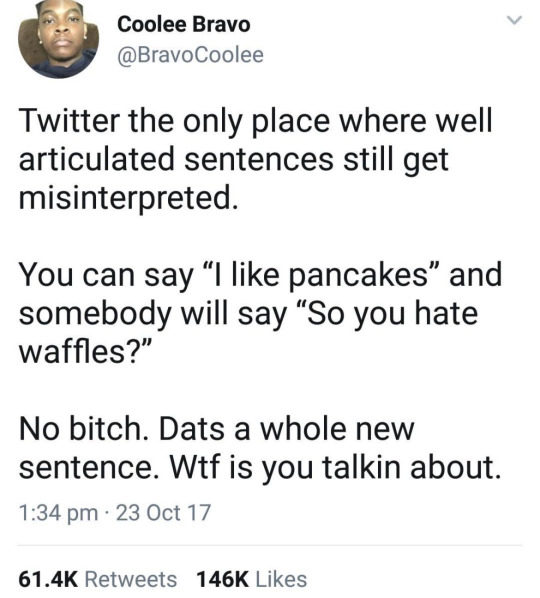
"I don't think Harumi is evil but I'm also not gonna defend her actions because her actions are absolutely evil" "So you think Harumi's actions are excusable?" no i think she's a deeply traumatized person who lashed out violently because her adopted parents neglected her and she basically blamed lloyd for having ever been neglected in the first place which made her lash out violently even more
#lego ninjago#ninjago#ninjago harumi#harumi jade#tw child neglect#i say she blamed lloyd for the emperor and empress neglecting her because she blamed lloyd for her bio parents' deaths#which comes off to me like shes also indirectly blaming him for the neglect she suffered#anyway good vs evil is a nuanced topic and harumi is a fascinating character in that regard#youd think ninjago fans would know that good vs evil is a nuanced topic considering its 90% of what ninjago is lmfao#like yall theres a difference between 'excusing someones actions' and 'i used this scene to explain why harumi turned out how she did'#WAIT do i get accused of excusing harumis actions because people hate crystalized??? is that whats going on????#because the scene i use to explain myself is from the second to last episode of crystalized??????? DID I JUST CRACK THE CODE?????#anyway. evil actions dont make an evil person. thank you for coming to my ted talk#and yes this is a hill i am willing to die on before anyone asks#ALSO ALSO something being justified doesnt inherently make it excusable. even then im just covering my ass. i dont think she was justified
14 notes
·
View notes
Text
Fazbear Frights: What We Found Analysis
Here’s my analysis for What We Found, the third story in Gumdrop Angel. I wrote this as I read so it may be a little different than my previous analysis where I read the story first and went back.
If you’re a Michael Afton fan I highly recommend this. Also, there’s possibly some insight into William Afton, Mrs. Afton, and Henry too, so it’s worth a skim.
Pg 144 '...a place thirty-some years forgotten'
Just reconfirming FNAF 3 is 30 years past *one* of the FNAF closings, presumably FNAF 2 location.
Pg 145
"The whole building was giving him [Hudson] a headache."
FIX THE VENTILATION BRUH
Pg 148 '...they were able to use salvaged derelict equiptment original to the old pizzerias.'
Another confirmation of something we heard from Phone Guy.
Pg 147 "How old are you?" "Twenty-three, same as you."
I think this gives us Michael's age during FNAF 3.
EDIT: This kept me awake last night. Obviously this is impossible because he has to be alive for at least 10 years before 1983, BUT maybe its just reconfirming FNAF 3′s year? 2023?
Pg 149
"Hudsan's dad died and his mom married Lewis, a ridiculous balding man who wore plaid vests and smoked a pipe"
Did... Did this book just seriously imply Mrs. Afton left William for Henry? Really? (Yes, there's differences; the husband is dead and the man wears plaid 'vests' but it seems very odd to include that detail. This could just have been the writer's own imagination, though.) I have seen this as a fan theory and 100% explains the jealousy aspect of William, but I can't help but kinda hate it. I think this is very important, though, and probably Scott's intention.
"This horrible little man [Lewis]... would make Hudson's next ten years a living Hell"
This REALLY intrigues me given the context I just went over. The text implies Lewis was fairly neglectful to our main character / Michael stand-in Hudson. Maybe I'm wrong and for some reason Mrs. Emily left and went to William? XD Haha, I'm reading too much into this page. Maybe I'll come back to this later. I figure it's more of Scott possibly including double-details (contradicting stuff with the same character that really applies to two, which has been something I heavily pointed out in previous anaylsis on this blog) Having said that, I'm going w/the former because I can't imagine Henry being abusive (neglectful yes, abusive no) and he's never been portrayed that way in official works like William has in the novels.
Pg 150
"Hudson began to screw up in class...a product of spending the night in fear that his stepfather [Lewis]... [would] beat him just for the fun of it."
Ooof. Big confirm on William actually being abusive. Unless we stick with the Henry theory for Lewis (combined with Midnight Motorist Henry theory / alcoholic).
"...near-daily beatings..." "his mom started taking pills to get through the day..."
So, whoever Mrs. Afton is, she was definetly not paying attention. But then, most people married to serial killers either don't notice because of denial (like this) or because the killer is so manipulative / careful they can't notice.
"Barry, who had red hair and freckles..."
Yo?! Is that a description of Fritz?! These friends in the story could be the other kids Michael knew's stand-in's, aka the two gravestones with names he used (Fritz and Jeremy), as shown in the checks for the games and FNAF 6. I've long figured Michael was probably friends with the victims--it makes them easier, although riskier, targets [for William]. The two friends are male, too, like Fritz and Jeremy. If you're curious about Duane's description (our stand in for Jeremy), it's "tight black shirt... muscles... black hair long enough for a glossy ponytail..." I'm not sure if this matches anything found in the novels or contradicts them, though. (The novels = TSE trilogy)
"And so it went... until the night of the fire."
For context, this is before FF burns down. We're learning of Hudson's life from his close friends in childhood, his father's death, his mother remarrying, to his abusive stepfather, to his grades slipping to this line. This would be a new fire not seen/mentioned in the games...
Pg 151
"...go to Charlie's for a sundae..."
Really. Really Scott. Just gonna use this name again. OK. I'm not even gonna discuss this because it's probably irrelevant. *This is confirmed on pg 158 to be an ice cream shop. No lore relevance aside the annoying name coincidences Scott loves to troll with.
"This is not... an advance into enemy territory, a fight with demons, or a descent into Hell..."
Uh, what? What is Hudson talking about? XD I'm only noting it because it seems so out of place. He's probably talking about video games or something.
Another note, although I don't have a specific reference since it is mentioned off-hand many times, is that Hudson keeps referring to his "history" which is implied to have kept him from getting a well-paying job and a girl he's crushing on doesn't know this "history" which is good for him. Seems good old "Michael Stand-In" has done some jail time or something.
Edit: On pg 154/155 the girl asks Hudson, "Did you do it?" Seems he may have killed his stepfather or been involved with something else just as bad.
Edit 2: No, I was thinking too deep into it. This probably refers to Evan's death at Fredbear's. DUH.
Pg 156 describes an actual "prize corner" in FF! What am I even reading? IIRC this is in FNAF 3, too. So they just hand out these scary gift boxes to people that complete the attraction? (Hudson says he *would* have fun handing out the scary toys to kids when this location opens--kind of a bully thing to do, eh?)
"[Hudson] avoid[ed] glancing in any of the mirrors..."
I'm only pointing this out because it could be reference to one of two things. 1) We know because of one of UCN's music tracks, William has a fear of his reflection. Michael probably shares this trait, especially since 2) after Ennard and all... and later on pg 157 it also says, "he never wanted to face: himself" Sounds like guilt, my guy.
Pg 157
"blonde hair... blue eyes..."
Hudson shares an eye color with Michael. It's possible Michael had blonde hair as a child and it changed to brown (it's common, something I personally went through being technically blonde/ blue eyed myself)
"He [Hudson] knew from personal experience that toys could turn from fun...to torture ina heart-beat"
Fairly self explanatory. Either Hudson's worked at a creepy location before or he doesn't like remembering Fredbear's.
*checks how much is left.* There's still 35 pages (not counting back/front) left of this... This is gonna be a lot of notes.
Pg 158
Hudson doesn't have a car. Poor Mike, probably having to walk everywhere. Especially as a corpse.
Pg 160
This page describes many physical issues Hudson has that prevents him from entering the Navy, all from the abuse of Lewis. Obvious paralell to Michael becoming an undead [because his father sent him to CBPR indirectly causing his condition]
Pg 161
"How's your granny, Hud?... ...Is she still alive?" "I don't think she can die."
Does anyone in the Afton family really 'die'? XD
Pg 162
These few pages discuss Hudson's grandmother. She's described as "a seer who claimed to know the future... ...wore big men's plaid flannel shirts with baggy jeans"
Um, more plaid / flannel? AGH. STAHP. Lowkey, I would totally headcanon my Aunt Jen like this, though.
Pg 163
"Hudson's mom... the way she was before Hudson's dad had died... never... particularly warm and fuzzy... but... effiencient and responsible..."
More about Mrs. Afton, so that's kinda neat.
"Hudson's dad was fun and attentive."
There's a good Dad in this series?
"Unfortunetly, he also struggled with mental illness."
"invisible low points" (Pg 164)
Kinda reminds me of how Henry is described after Charlotte's death in the books.
Pg 164
"When Steven got himself into a bad deal that cost him his small business... he'd taken his life."
Oh, it is Henry! SMH. Way to use confusing paralells. So, from our understanding thus far, Hudson's real father, Steven, is our Henry stand-in. His step-father despite being described similar to Henry, is actually our William stand-in. Fair game, Scott.
Pg 164
"...he [Hudson] was locked into a supply closet..."
Oh shit, you guys. So, let me go on a tangent here, because this IS important! I just watched a retrospective on Sister Location and FNAF 6 earlier and one theory for Midnight Motorist was the person in the chair was the mother and the kid was Michael. I think this little line may confirm that. In fact, the story may be the key to figuring things out. Obviously, the line is a paralell to FNAF 4's scene in which Crying Child was locked in the supply closet of Fredbear's. I know some people, including Matpat, believe[d] CC was Michael, and in this book's context, it sort of works. This does contradict Step Closer and 1000 other things that make Michael the older brother, but maybe it's hinting at MM? Abusive stepdad (possibly Henry... maybe William is gone at this point), checked out Mom (hey, grey couch lady with Foxybro's font). IDK, but its definetly something to think about.
Pg 165
Lewis is mentioned as calling Hudson "nothing" and saying "you're nothing" on several occasions on this page. Just more abuse, for those accurate fanfic writers like me. Also I kinda wanna watch Morel Orel again. Yall know my fav character is Clay. Yall know.
"You're smoke." <-- Lewis / The text later reads, "...there was some irony, given what eventually happened."
BRUH. Why did your stepdad die in a fire? :V TELL ME.
"When his family's house burned down at the end of his senior year..."
Huh. Is there a fire we don't know about in the game-verse? Could this explain what happened to the FNAF 4 house before MM house?!
"...it purged Hudson of Lewis and his mother."
MRS. AFTON BURNED ALIVE, TOO? Bruh. I can't with this story.
The text later describes the fire is concluded to be man-made and Hudson was blamed for it. Can't say if this ties to Michael, but it IS interesting... TBF, there is a small paralell to draw between Henry in FNAF 6 and his history of suicide in the books, too.
Pg 166
"...this place's [FF] busted thermostat.."
I just find this line funny.
Pg 167
"...after three weeks of keeping an eye on the place"
Some more timeline context for FNAF 3. We know that Michael worked there a little while before we start playing the game thanks to one of the phone calls, IIRC, so this makes sense. If Michael was accused of [something] and also wanting to hunt down his father, then it makes perfect sense why he's working a dead end job at Freddy's over and over and over. Fun fun fun.
Pg 169
"He hated to think about a functional character [Foxy]"
This line is in regards to Hudson not liking the set up of Pirate's Cove and Foxy's hook to scare people. Sounds familiar, don't it? (For Michael anyway.)
Pg 173
"Some big find is arriving tomorrow."
SPRINGY BOI! COME ON BOOK, get on with the show?
Pg 176
"Granny was wearing a red-and-green plaid shirt and her baggy jeans."
Nothing special, but it was specifically brought up twice. I'm kind of racking my brain trying to understand what the point of this character is outside of "woooo everything is haunted don't you know that" kind of character.
Pg 180
"...dropped the crate on the linoleum with a resounding thud."
HEY. Poor Springtrap, just gettin' tossed around like the trash he is.
Pg 186
"If you weren't so stupid, I'd tell you more about it."
Springtrap bringing the burn. =:)
"A voice with a burr-like rasp...hint of a Southern accent"
I'm going to assume this is because it's Lewis probably in the suit in this story and not our old British lad.
"It's was Mr. Atkin's voice."
THE MATH TEACHER? *goes back to check* 'The algebra teacher'. Okay...
Pg 190
Okay, so Hudson hear's Lewis' voice this time. Okay, I get it now. Springtrap in this kind of imbodies all of Hudson's old bullies, including the teacher. He also has PTSD, just FYI. IDK if anyone finds that important, but it's fairly obvious by the line "He wasn't in his bedroom. Lewis didn't just slam his head into a desk; his head had been slammed into the [arcade] game."
"Why did he hallucinate a scene from his childhood?"
Oh, it's not PTSD, then. It's just the VENTILATION ERROR. lol Okay.
Just a note, as I'm reading through the more action-based stuff, I kind of feel bad for Michael if he had flashbacks like this guy. They're intense.
So, Lewis' voice finally comes out of Springtrap on Pg 213. There's that.
Pg 220
"You can just stay there [in his room]"
Kind of a paralell to Midnight Motorist. Lewis is saying it to Hudson. I really feel like the kid in the MM game is Michael because of this story...
Pg 223
"Heat purges. Fire heals."
I'm sure that's Henry's life motto.
The ending was stupid, but most in these stories are. Hudson is hallucinating and is implied to have burned himself alive in FF's oven. Meh? The first half of this one is A TRIP and a little insight into what I 100% believe is Michael's childhood. I think the saddest part of it all is that we never got Springtrap speaking to Michael in FNAF 3--and if it's ever remade I hope we get more of them interacting.
#fazbear frights#fnaf spoilers#spoilers#what we found#michael afton#springtrap#fnaf theories#fnaf theory#fnaf 3#midnight motorist#mrs. afton#henry emily
34 notes
·
View notes
Text
10 Danny Phantom Episodes with Good Concepts that Sorely Disappointed Me: “The Ultimate Enemy” (Part 2)
Alright, here I am, everyone—part two of my critical analysis on “The Ultimate Enemy”, and how its faulty writing let down a good episode idea. For those stumbling across this for the first time, I am in the process of composing an analytical list of ten Danny Phantom episodes whose concepts I liked, but didn’t like the execution of. “The Ultimate Enemy” is the first on this list. Due to the size of my complaints with the episode, I’ve split my arguments into multiple categories across multiple posts; I highly suggest you start from the beginning with part 1 here before moving onto this post. It covered the main introduction, and Category A of my problems with the episode: the plot points that were primarily irrelevant to Dan’s character.
For those of you continuing from the first part, I apologise for this part being overdue. I proposed I would edit and upload part two roughly a day after part one, but those days dragged on due to constant re-editing and problems with my mental health. Parts three and four shall probably take longer than a few days to edit and upload as well, as I discovered arguments in the essay that needed massive overhauls before posting. I can guarantee they’re coming eventually (the whole thing essay is fully written, point-wise); I need to rework and trim the fat off some paragraphs.
Without further ado, this post will take a look at everything I’ve chucked into Category B—my issues with Dan’s characterisation, and how what the episode showed us about who deserved responsibility for Dan contradicted what it told us about how Dan was created.
(Also, because of my saltiness seeping in when I was writing, my captions for the images got a little too snarky for an analytical essay, but I am too tired of re-editing this section to remove them. Hopefully, they’ll serve as humour; if not, I apologise.)
1. The episode incorrectly portrayed Danny as the only one responsible for Dan’s existence, and for the wrong reasons (the wrong events in the timeline). Upon scrutiny of the actual sequence of events that led to Dan’s creation, the direct responsibility for Dan’s birth was either an even split between Danny and Vlad, or slightly more Vlad’s fault (depending upon the interpretation of the event that did actually cause Dan).
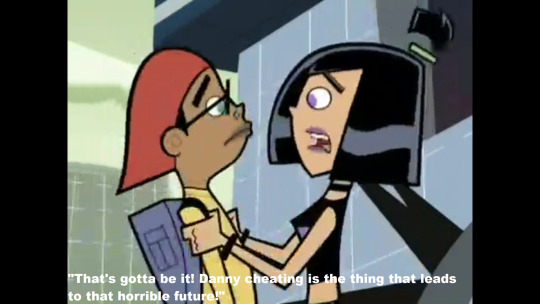
(Spoiler alert: No. No, it was not.)
The episode initially chose to establish Danny cheating on the CAT as the cause for Dan’s existence. While this was partially, indirectly true (since it set up the chain of events that led to Dan’s creation), it was not the event that directly caused Dan—yet, the episode treated it as a highly important tipping point, close to the point of no return that led to Dan. Looking at Dan’s backstory from the information Future Vlad gave (as dubious as it was), and working backwards, it was clear that Danny cheating on the test was not the vital “point of no return” by any means. Neither was the explosion at the Nasty Burger, for that matter (which the episode treated as the point of no return after Dan cheated on the CAT in Danny’s place, which required the episode to postpone the narrative stakes of preventing Dan’s creation to the Nasty Burger fight).
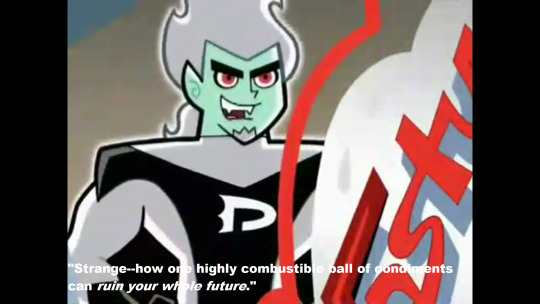
(Well...not exactly--it didn’t ruin Dan’s future, but it did ruin Danny’s. There’s a distinction.)
Kick-starting the entire chain of events that set up the eventual moment of Dan’s birth was not synonymous with directly creating Dan, and blaming the causality for Dan’s existence on Danny cheating (the leap of logic that “Danny became evil in the future because he cheated on a test”) or even his loved ones dying at the Nasty Burger was incorrect.
To demonstrate the argument, I’ll shift to an in-universe hypothetical:
Imagine yourself in Clockwork’s shoes: an “evil future version of Danny” has been created, and you have to prevent Dan’s existence by searching through the events that led his creation to find as many openings between key events as possible, in order to change one and subsequently avert all the events (including Dan’s creation) that followed.
To lay it out in full, the chain (separating the events based on intervention windows) was as follows: (1) Danny cheated on the CAT -> (2) Mr. Lancer met with Danny’s parents at the Nasty Burger to discuss it -> (3) they (including Sam, Tucker and Jazz) died in the Nasty Burger explosion -> (4) a grief-stricken Danny went to Vlad in Wisconsin -> (5) Danny requested that Vlad numb his emotional pain -> (6) Vlad split Danny’s ghost half from his human half—only for the ghost half to immediately pull out Vlad’s own and fuse with it into Dan.
Dan’s existence being the result of (what was essentially) a disastrous line of falling dominoes made his origin more sinister, but also highly easy to prevent (at least, without taking into account the mess caused by the story’s poorly thought out use of time travel, which I’ll explain later in section C). After all, the more complex a system (the more elements necessary for a system to successfully operate and achieve a desired result), the more weak spots it has—as meddling with one part can affect all the other parts and lead the entire operation to fail.
Utilising any of the intervention room between the events in “The Ultimate Enemy’s” alternate timeline would prevent Dan’s entire existence. The only event, therefore, that could be labelled the direct cause of Dan’s existence was the event that immediately resulted in Dan’s birth, and the most dire pivotal point—which rendered Dan inevitable—was the event directly before that. The event of Dan’s creation itself (or the cause of Dan) was event number six—the removal of both Danny and Vlad’s ghost halves using the Ghost Gauntlets, and their subsequent fusion with each other. The event which led to this—event number five, which was Danny’s request for Vlad to remove his emotional pain—was the direct catalyst for the procedure, and therefore the important “point of no return” leading to Dan that the episode tried to make Danny cheating on the CAT (and once that was over, the act of losing his loved ones) out to be. (Technically speaking, it was one of possibly two options for the event upon which Dan’s existence truly hinged—number four was also a likely candidate).
Danny cheating on the CAT was not the cause of Dan (even if it set the eventual stage), because there were numerous ways to interfere after the incident of Danny cheating the CATs and still prevent Dan from existing. Clockwork could’ve interfered between events one and two, by changing Mr. Lancer’s parent-teacher meeting location to anywhere safer than the Nasty Burger, so no one died (he could’ve utilised Jazz to sway Mr. Lancer, perhaps—it’s safe to assume Clockwork was aware of her knowledge on Danny’s secret, and she was the one Mr. Lancer approached about Danny cheating). He could’ve interfered between events three and four—had Danny’s loved ones still die at the Nasty Burger but convinced Danny himself not to go to Vlad. He could’ve popped in between events four and five and convinced Danny, right after moving in with Vlad, to not ask for a way to numb his emotional pain. However, Vlad proved to be a dubious source in the flashback of Dan’s origin story, and was typically too much of a wild card, so preventing Danny from moving in with Vlad at all is likely the safest option.
Ergo, either event four or five should’ve been treated as the important point that led to Dan’s existence. On top of that, Vlad’s role in event six proved he was partially responsible for Dan’s creation, but the rest of the episode outside of the flashback neglected this fact in favour of pushing the “Dan was all Danny’s fault” message.

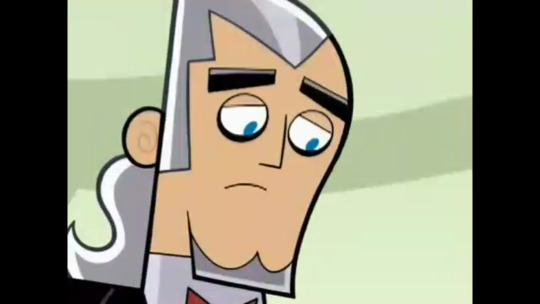
(Begin Vlad’s unreliable narratorhood in 3...2...1...)
However, Future Vlad behaved like an unreliable narrator of the
“Dan’s creation” flashback, so his explanation of events shouldn’t be taken at face value. Assuming the basic outline of events was trustworthy, however, the episode indicated to us that Vlad was roughly equally as responsible for Dan’s creation as Danny. He conceded to Danny’s desire to escape his emotions and responded with the halfa-splitting operation that caused Dan’s fusion.
He stretched the reality of the event to Present Danny when he exaggerated the delivery of some (if not most) of his narration lines in the flashback. It was most blatantly clear in the line where he inflated his importance to Danny after the tragedy, “With nowhere else to go, you came to me—the only person left on the planet who could possibly hope to understand your situation.” He verbally emphasised the words ‘me’ and ‘possibly’, and the phrases “the only person left on the planet” and “could possibly understand” were hyperbole in their own right. Another was the line, “No more painful human emotions to drag you down,” where he spoke the italicised words with overt disdain for Danny’s emotions. It could be interpreted simply as Vlad’s typical habit of speaking in a dramatised manner, rather than trying to make himself look good to Danny by stretching the truth. However, even if choosing to interpret Vlad’s delivery as the latter, he still skewed his recount through vagueness and omission in the literal content of his narration (when linked to the visuals that ran alongside his lines).
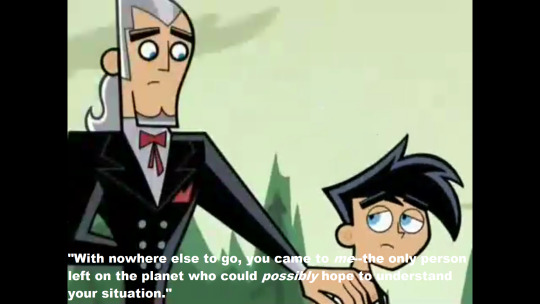
According to Future Vlad, Danny asked for his emotional pain to be taken away; and Vlad removed his ghost half to “[honour] [his] wishes,” while the shot changed from Vlad’s sympathetic face at the grieving Danny to the procedure with the Ghost Gauntlets. Future Vlad never explicitly stated whether it was Danny or him that decided removing Danny’s ghost half was the course of action to take, Vlad only explained that Danny “wanted to make the hurt go away”, and then the shot cut to Vlad removing Danny’s ghost half with the only explanation that he was acting in accordance with that wish.
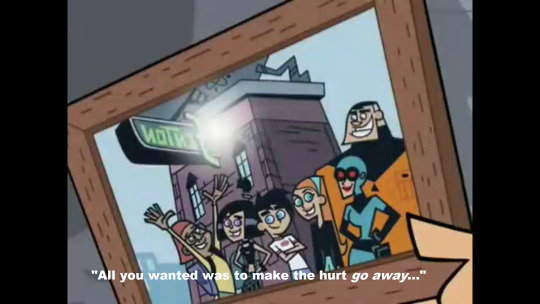

On top of not explicitly saying whose idea it was, (though, with Vlad’s knowledge and experience with halfa research far exceeding Danny’s, it was almost certainly his) the episode did not explain how his logic leapt from “remove Danny’s emotional pain” to “remove Danny’s ghost half”, which was an insensible method to solve Danny’s problems.

The “no more human emotions” line indicated that his intention behind the procedure was to remove Danny’s human emotions, yet he knew that the procedure entailed removing Danny’s ghost half.
It made no sense, in universe, for Vlad to competently assume that removing Danny’s ghost half from him would work to remove an emotionality rooted in his human half (the episode overall, by the way Dan referred to human emotions and sentimentalities as a “humanity” he gave up, implied that it intended to frame the emotional attachment to Danny’s loved ones as part of his human half). If it could be chalked up to an external fault, like the lack of clear research into the procedure’s outcome, and not Vlad’s failure to realise the logical inconsistency, the episode needed to give evidence of this. Without that information, the only feasible assumptions were either that he wasn’t making any sense in-universe, he was supposed to be sensible but the episode’s writing didn’t make sense, or he had an ulterior motive for convincing Danny into going through with the operation. Either way, it was yet another part of Dan’s creation that Vlad was responsible for, not Danny, and the episode’s message was illogical to contradict this.
Through potentially exaggerating his sympathy for the alternate Danny in his verbal intonation, and blatantly failing to mention the details of why he chose removing Danny’s ghost half to fix a “human” problem, Vlad told his version of Dan’s birth in a way that would minimise his moral fault in the incident to Present Danny. His only logically feasible motivation for this was to hide further moral accountability for Dan’s creation than what we already saw in the face-value version of the flashback.
To summarise this entire sub-category of arguments, the episode was wrong to pin Dan’s existence on Danny cheating on the CAT (and even on losing his family, as the second half of the episode changed gears to), rather than his desire to remove/escape his emotions (even if the deaths resulted in the pain that he wanted to remove in the first place, which I shall explain later in Section D). It was also mistaken to portray Danny as the primary cause of Dan, rather than acknowledge that Vlad was equally (if not more), responsible than him.
Additionally, the fact that Vlad, as an in-universe character, tried to minimise his moral role/accountability in the physical causality of Dan’s creation by skirting around the truth in his retelling was something that the episode itself should’ve acknowledged or called out, through more reliable information from a third-person or other characters’ perspectives such as Danny, Dan’s or Clockwork’s—but it didn’t.
2. On top of physical responsibility for Dan, the episode was wrong to pin Danny with the moral blame and identity of Dan. It treated the two of them as essentially the same person, and portrayed Dan as just a Danny from the future who turned evil because of a combination of Danny’s potential evilness (potential to do “selfish/evil” things) and tragic circumstances. Considering Dan’s backstory, it made no sense for Danny to be the sole owner of either Dan’s immorality or identity/personhood.
Dan’s backstory told us that physically Danny wasn’t solely responsible for his creation, but the rest of the narrative still deeply connected Dan to Danny alone by treating Dan as what would happen if Danny let his pre-existing moral flaws take over him—that Dan’s villainy (or evil nature) came from Danny.
Clockwork referred to Danny Phantom as “grow[ing] up into the most evil ghost on the planet” in the cold open (which, given that Dan was a product of a fusion, was blatantly false.)

“The Ultimate Enemy” attempted to build up the idea that Danny had the potential for evil, and that Dan was him realising his own evil, in the scene where the trio entered Clockwork’s lair. As they watched Dan’s carnage through the observation window, Danny excitedly admired Dan’s Ghostly Wail, completely oblivious to the seriousness of the situation, and Sam called him out for not reading the room.
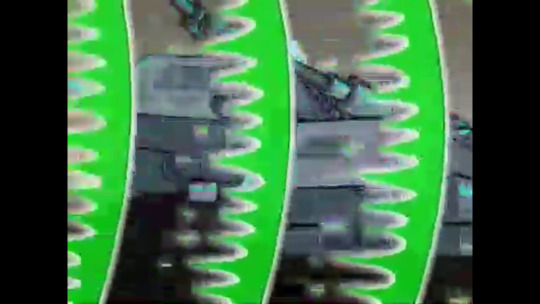
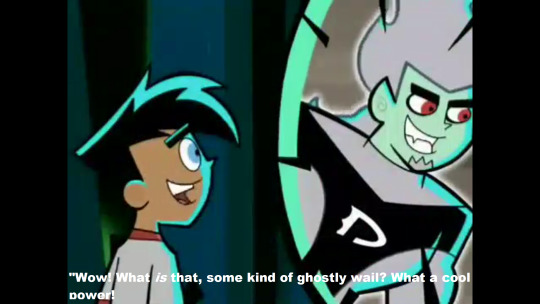

(Though, Sam’s condemnation of Dan’s villainy was extremely underwhelming—calling a world-destroyer and (presumable) mass murderer just “kind of a jerk” in a snarky tone did not do the severity of Dan’s actions any justice.)
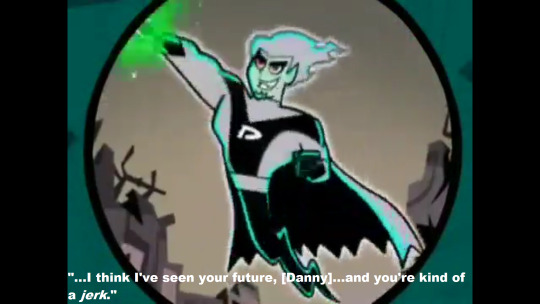
When they confronted Clockwork, Danny scoffed at him to find just “one” evil thing he’d done. The shot then immediately focussed onto “examples” of Danny’s “evil” in the time window—first, Jazz finding out Danny was going to cheat the CATs (which, as established in point one, was not as morally significant as the episode tried to portray it—that shall be further elaborated later in Section D). After Tucker sassed at Clockwork, “[I] bet you can’t find two!”, the time window changed to Dan standing atop his destruction in the alternate future, and Clockwork replied, “How about two thousand?”—implying that Clockwork was referring to what Dan did in the future as at least part of the (supposedly numerous) evil things Danny did (or would do). This made no sense unless the episode was implying that Dan’s immorality was Danny’s own. However, this implication was incorrect, leaving Clockwork to state that he had seen countless instances of Danny Fenton/Phantom being evil with no valid examples to show for it whatsoever.
Dan’s atrocities had no weight as examples of Danny’s morality flaws due to the fact that Dan’s evil was not primarily Danny’s to begin with, creating a feedback loop of invalidation; evidence for the argument was invalid because its own validity was dependent on the validity of the very argument it was supposed to be supporting.

(Danny, despite the episode’s reluctance to be fair to him with its accusations of his “potential villainy”, was actually justified in asking this of Clockwork. You know there’s something wrong with your story when your self-centred, short-sighted teenage protagonist is righter than your supposedly all-knowing Master of Time in this situation.)

(Cheating on a test is not evil, Clockwork, try again.)

(Nope, sorry, Dan’s evil is not Danny’s “evil”; your argument is invalid.)
(I typically put the “improvements/fixes” part at the end of each point, but for the sake of its direct relevance to the aforementioned example, I’ll put it here to avoid structural confusion in the essay:
“The Ultimate Enemy”, for some reason decided that its reason/foreshadowing of Danny’s potential for evil had to be self-contained; ironically, almost all (sans a small few) of the episode’s examples of Danny’s moral flaws weren’t “evil” at all, and they would’ve been far better off using actual events of Danny showing potentially villainous traits from previous episodes. Danny may have been justified in asking Clockwork to name one evil thing he’d done, because that accusation had no basis at that point, but Clockwork’s response should’ve been to show previous instances in the series where Danny took advantage of others with his powers.
For example, imagine if in the episode, when Danny demanded, “Name one evil thing I’ve done!”, Clockwork’s time window had switched to moments like the end of “Maternal Instincts”, where he manipulated Vlad into lowering his guard, or his acts of overshadowing Dash for petty revenge in “Splitting Images” or “Reign Storm”? Not only were they more legitimate examples of morally corrupt characteristics—tricking people for his own gain/victory and abusing his powers to the detriment of others—it would’ve given such a significant episode in the series more continuity with the previous ones. In fact, the examples in two of those previous episodes resulted in Vlad pointing out that Danny was becoming more like him, as a way to use Vlad’s relationship as Danny’s nemesis/character foil for the sake of tension. “The Ultimate Enemy” could’ve used those examples in its own narrative to turn Dan into a proper payoff of this long-term build-up of Vlad’s whole “We’re not so different, you and I” thing going on with Danny.
Also, it would add to the thematic irony of Dan being a fusion of Danny and Vlad’s ghost halves, if that aspect of his backstory was not altered in a rewrite of TUE.)
Vlad owned Dan’s evil nature equally as much as (if not more than) Danny because Dan was also half-Vlad. However, the episode neglected to acknowledge this outside of a few seconds on Dan’s birth in the flashback. While explaining the scene of the two ghost halves fusing into Dan, Future Vlad’s most honest lines of narration (because they straightforwardly confessed he was morally accountable for Dan to Danny, and thus had no motivation to be a lie) explained that, “My [ghost half’s] evil side overwhelmed you”. This implied that the reason Dan turned out evil in the first place was that Vlad’s evil took over Danny’s mind during the fusion.
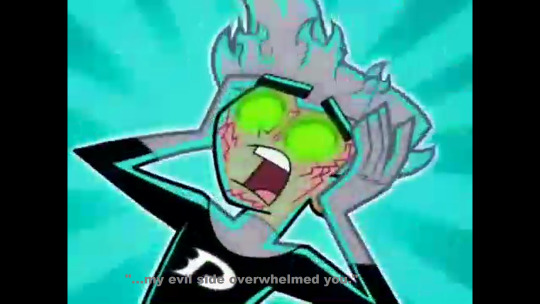
Given that we trust Vlad’s line, Vlad (or Plasmius, as Vlad’s ghost half) deserved most of the accountability for Dan’s lust for destruction and lack of a moral compass, not Danny. So, calling Dan “Danny’s evil future self” was only accurate in the literal sense of “this is what remained of Danny’s mind/existence in the future—his ghost half—even though it’s only a part of a larger fusion with another ghost, and this fusion is evil”. Dan was not a warning that “Danny was going to turn evil”, because Danny was not the primary source of Dan’s villainy.
In regards to overall personal identity, rather than just morality, Dan was also not “Danny’s evil future self” on account of the fact that he was not “Danny’s future self”, period. He shouldn’t have been an “older Danny” (or essentially the same person as Danny but older and evil), according to his backstory’s statement that he was half-Phantom, half-Plasmius. Yet, for some asinine reason, Dan only identified himself personally as “Danny” for the duration of the episode (without mention of Vlad).
After travelling to the past under Danny’s guise, Dan referred to Danny’s bedroom and face in the mirror as his own.
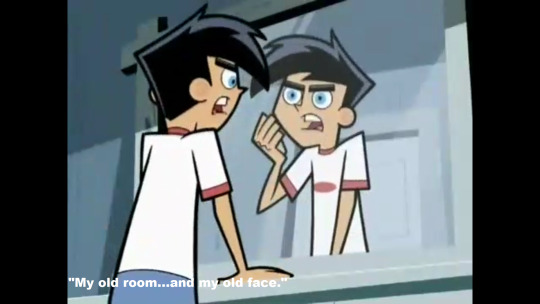
(Whoops--another image where I goofed the subtitles, this time in formatting...and MS Paint’s lack of layers makes redoing it an unnecessary pain. Sorry about that.)
When he met Sam and Tucker in the future, he explained his cold response to seeing them again as a result of “[surrendering his] human half a long time ago”. His singular human half. Not plural…because even Dan himself wanted to pretend that he wasn’t half Vlad, for some reason.
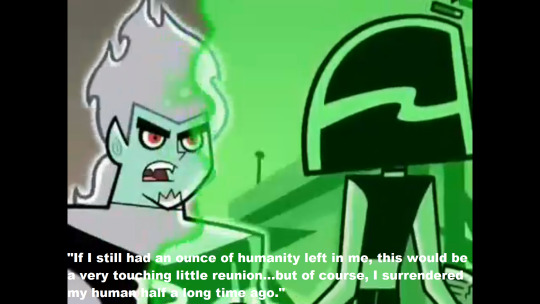
Perhaps it could be chalked up to people behaving differently in different social contexts; in that case, it was understandable that—even if he was part-Vlad—his Danny-side and memories influenced him the most in front of Danny’s friends…but that alone didn’t justify him stating that he only had one human half as a fact. The only other option that made in-universe sense was that it was a deceit/falsehood on Dan’s part, and therefore knowingly untrue. Perhaps Dan didn’t want to admit that he had more than one human half to Sam and Tucker—because he was not obliged to divulge that information to them—or that he preferred to mentally distance himself from Vlad’s human half because the latter was still alive, and separate from Dan. However, it was still untrue to link Dan and Danny together as people, but not Vlad, with the idea of only owning Danny’s human half.
The assumption that Dan was a future, evil Danny in person (and not also part-Vlad in person, or a new person from either of them entirely) implied that the fusion resulted in Plasmius’s mind giving his evil to Danny’s and then disappearing into the aether. It implied that a fusion of two people resulted in a powered-up being that was solely one of them psychologically, in order to purport that Danny (or, at least Phantom as his ghost half) was still Danny in sense of self for the last ten years in the alternate future. This contradicted the more logically valid implication that Plasmius’s mind or identity still existed as a component inside Dan, and Dan was at least both Danny and Vlad mentally.
Vlad explained in the flashback, “[Vlad’s] evil ghost half mixed with [Danny’s].” The general interpretation of “mixing” implied that the two ghost halves merged together into a new being and their traits and minds blended together. His identity should, theoretically, be either a half-and-half joining of the two halfas, or a whole new person with Vlad and Danny’s ghost halves as mere fusion ingredients. Ten years of existence and experience after the initial fusion would also, theoretically, give Dan enough time to develop this new mixed mind into his own individual sense of self beyond who/what either of Danny or Vlad were as people (prior to the ghost half fusion). In that case, Dan was not Danny’s “future self” in identity, and had little reason to identify Danny’s face, room and family as “his old [life]” (or, at least his only one).
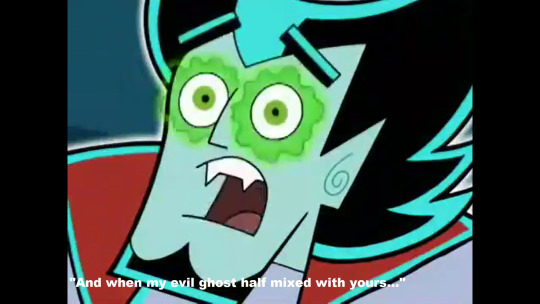
The next most obvious theory (about Dan’s psychological makeup as a fusion) is that one half was more dominant than the other during the fusion, leading to Dan to become primarily just one of them in identity. That dominant one had to have been Danny, based on how Dan identified himself in the episode, but that wouldn’t make sense. Phantom taking full control of the fusion and assimilating Plasmius into himself required that a grief-stricken fourteen year old was somehow capable of winning against a more experienced forty-something in a battle of minds, thoroughly enough to the point of absorbing the latter. Considering that Phantom was mentally weak enough to be the one “overwhelmed” by Plasmius’s evil (a single facet of Plasmius’s larger mind) almost immediately, that hypothesis seems unlikely. The notion of Phantom overwhelming Plasmius in the fusion to gain dominance, and Plasmius being the one to overwhelm him to turn him evil, contradict each other. Ergo, Dan being a mix of both Phantom and Plasmius was the most likely (and sensible) outcome of the fusion.
In that case, the episode was thoughtless and inaccurate to treat Dan as “Danny’s future self who became a villain”. Dan was not inherently linked to Danny in either the majority of his morality or his identity, due to the part Vlad played in Dan’s creation, and his mental component in Dan’s fusion.
2.5.A notable counterpoint, for the sake of not one-sidedly flipping all of the fault for Dan onto Vlad:
To be fair—as the idea of solely blaming Vlad would also be inaccurate to what Dan’s origin story showed—I should acknowledge a piece of evidence explicitly indicating that Danny still contributed some of his own darkness to Dan’s villainy, albeit less than Vlad. Once separated from his human half, Phantom ripped out and fused with Vlad’s ghost half of his own volition, all with a malicious grin on his face.

However, there was no clear motivation or reason for the separated Phantom to fuse with Plasmius (the physical cause of Dan that Danny/Phantom could be blamed for) —in fact, it made no sense for there to be any premeditated intention for Phantom to fuse with him, since he couldn’t have known that fusion with another halfa’s isolated ghost half was even possible at that point; it was an untried, never-seen-before method, hardly likely to mentally occur to Danny in the first place. Phantom resorted to attacking Vlad, stealing the Ghost Gauntlets and pulling out Plasmius for some unknown reason, but ghost-half fusion could not have sensibly been it. The Gauntlet attack simply demonstrated that Phantom took ill-willed pleasure from the act of hurting or depowering Vlad. After removing Vlad’s ghost half, fusing with it was the second step. Danny could be held responsible for his ghost half explicitly harbouring malice/potential evil in the attack (and his ghost half’s response to being removed was part of Danny’s responsibility in Dan’s creation), but that wouldn’t explain the crucial next step of the fusion itself.
This is where my ideas for potential improvements for the story of “The Ultimate Enemy” come in, as the exact extent of Danny’s contribution to Dan (in physical responsibility and mentality) wasn’t entirely clear—outside of this explicit evidence of Phantom’s facial expression. This uncertainty leaves the room for a do-over of the narrative to ask a lot of questions about how physically and morally accountable for Dan’s birth and evilness Danny actually was.
We could assume implicit evidence that Danny had some sort of inner darkness which contributed to Dan, even if only the minority, from the possibility that his grief at the loss of his loved ones (as well at helplessness at not being able to do anything to save them, and low evaluation of his own worth as a person) led to buried malice, anger and a desire for power to compensate.
Based on how splitting halfas apart worked in “Identity Crisis”, it made sense that Phantom had a sense of hostility and motivation to hurt Vlad once separated from Danny in “The Ultimate Enemy”. When Danny was split in half the first time, the halves took on the mental characteristics of the whole Danny’s momentary intents and desires. When Danny wanted his ghost half to do all the hero work so his human half could have the time to have fun, his ghost half took on an exaggerated hero personality and his human half an irresponsible teenager personality. Assuming this logic consistently determines the split halves’ personalities each time, and the fact that Danny’s desires in the alternate future revolved around escaping his emotional pain, it was logical that one of the split halves inherited a condensed majority of Danny’s pain (in this case, the ghost half), while the other half (the human one) was innocently blind to most of Danny’s grief and self-hatred—and that the suffering half acted out aggressively or malevolently as a result.
However, since we could logically assume that fusing with Plasmius was not the initial reason Phantom removed him from Vlad (and we assume the fusion was a spur-of-the-moment decision that occurred to him afterwards), why did he remove Plasmius in the first place? Was he intending to spite Vlad after all the grief he caused Danny in their rivalry? Was it a sense of inferiority telling him to tear Vlad down from his superior position? Was it to avoid letting Vlad stay a possible physical threat to Danny? There is such a large gap here, one could brainstorm countless possible motivations.
Furthermore, if that only covered his motivation to remove Plasmius, then what made him decide to fuse with him? Was he attempting to possess Plasmius as one ghost half trying to possess another for some reason? Was it internal panic? Was it a hunger for power pushing him to seize the opportunity that opened up? Why didn’t/couldn’t Plasmius fight Phantom off in the fusion scene?
These questions could be explored if the story of “The Ultimate Enemy” was redone. Present Danny, the Danny whose point of view we saw the episode from (rather than the Alternate Danny) hadn’t experienced the Dan future himself, so he didn’t know what was going through his alternate self’s head (human or ghost) during Dan’s creation. How much of it was his fault? How much of it wasn’t? How did he fill in the holes in the story Future Vlad told to him based on his own insecurities, and what did he blame himself for?
For that matter, why not get present Vlad wrapped up in it too? Have him take responsibility for what is HIS. If not, the episode should’ve at least acknowledged that Dan was not entirely “Danny’s evil”, and made it clear that he was cleaning up both his and Vlad’s collective mess by himself. If the message of the evil future self being Danny corrupted to the side of evil was so necessary for the episode, then simply remove the fusion plot entirely from Dan’s origin and have Danny become a villain by his own moral corruption. It weakened the impact of the future-self villain being a warning of “what the hero should avoid becoming” by having the main character only become evil by fusing with an already malevolent character.
3. The Observants’ conclusion that they had to kill Danny to save the world from Dan didn’t make sense, due to Vlad being primarily responsible for Dan’s evilness—but the episode, instead of acknowledging this inanity, actually reinforced the opposite.
Having now established that Vlad was half (if not more) at fault for Dan’s evil than Danny, the plot to kill Danny in the episode lost any of the ground it had to stand on.

(Nope...no, he didn’t have to.)
It was illogical for the Observants to assume killing Danny was the best way to stop Dan from existing when killing Vlad would equally achieve this (not to mention that either of these options were overkill, in the presence of the intervention methods mentioned in Section A). Without Vlad, Dan could not exist either. Eliminating Vlad would stop his continuous crimes against both worlds, and let Danny live to continue doing the good he’d done. After the events of “Reign Storm”, a large part of the Ghost Zone knew that Danny had saving Amity Park, and the entire Ghost Zone, under his belt—if an entire wasteland civilisation like the Far Frozen came to worship Danny for his victory against Pariah Dark (as shown in season three’s “Infinite Realms”).
(For that matter, where were the Observants hounding Clockwork to get on Vlad’s troublesome ass when he tried to steal the Crown of Fire and the Ring of Rage in “Reign Storm”, if Pariah Dark was so dangerous?)
If they were being somewhat rational, it was possible that they chose Danny as Vlad’s less powerful counterpart, and an easier target—even though they delegated the task off to Clockwork because intervention wasn’t their job, and they clearly acknowledged Clockwork’s power and competence to some degree. The Observants openly referred to Clockwork as the master of time while shirking their responsibility for fixing the future onto him, so whether or not killing Vlad would be too difficult for themselves would be irrelevant, since they made it Clockwork’s problem and became backseat commentators. Though, Clockwork would’ve probably foreseen Vlad’s importance in Danny’s emotional growth as his nemesis and also kept him alive anyway—but from a purely logical standpoint, it made little sense to execute Danny over Vlad, if they ever needed to kill anyone at all.
To be honest, the episode could’ve used the invalidity of the Observants’ plan to paint their incompetence more, expanding on Clockwork’s disdain for them and how he told the audience they “just observe”. However, to do that, the episode itself would’ve had to actually portray the Observants’ plan (not just the Observants themselves, but their actual plan to kill Danny itself) as nonsensical. The episode never did, however, as it had Clockwork—the character portrayed as bolder and wiser than the Observants—reinforce their proposition as worth trying and go along with their request for Danny’s demise. He sent two ghosts to attack Danny (although the fight with Boxed Lunch was more of a moral test about giving Danny the CAT answers, rather than an attempt on his life, Danny “failed” that moral test before Clockwork sent Skulktech after him—so, the latter at least counted as a potential hit on Danny) to the extent of attempting to kill Danny himself on the last attempt. That Clockwork went along with the Observants’ plan showed that the episode saw the plan as reasonable, despite its illogicality.
(While there is a possible argument for Clockwork’s knowledge of how the episode would end—insinuating that he knew Danny would never actually end up dying—justifying why he went along with the plan in the first place, the next section of the essay shall tackle that. Since Clockwork is the Master of Time, and the issues with his character were heavily intertwined with the effects the time travel lore had on the plot, that shall be addressed in Category C, the section covering the mess created by the time-travel in the episode.)
...actually, that just gave me an idea. You know what would be interesting, if a little too much to content to stuff into the narrative? Having an Observant character distinguished as their own individual, who doubts the other Observants’ unreasonable decisions and becomes a rogue element to the rest of the council, directly intervening in the timeline themselves. The rogue Observant could abandon the council of Observants to side with Clockwork, and characterise Clockwork by having him change his globalised impression of the Observants to understand this new, non-conformist one as an ally. Or, perhaps the Observant plays a more compassionate foil to Clockwork, choosing to himself save Danny’s life from the ghost attacks Clockwork sent after him?)
#danny phantom#danny phantom analysis#danny phantom essay#the ultimate enemy#danny fenton#vlad masters#dan phantom#the observants#danny phantom clockwor#time to get into one of the longest sections of this essay hoo boy#I apologise for the verbosity
37 notes
·
View notes
Text
FMA 03 - Brothers
Hey, here’s another post to round off the themes of family in FMA 2003. Here’s links to the first two: Mothers and fathers.
This one is focused on the relationship between brothers in the series (and, yes, I would have loved to have called this post Brotherhood... but I could not.) We meet quite a few pairs of Brothers throughout the series with our main characters being Edward and Alphonse, who’s relationship gets the most depth and development. I would be here all day trying to explore every facet of their relationship though! I’ll just try and briefly explain how their relationship can be compared to other brotherly relationships.
Let me start by looking at episode 38 - With the River’s Flow.
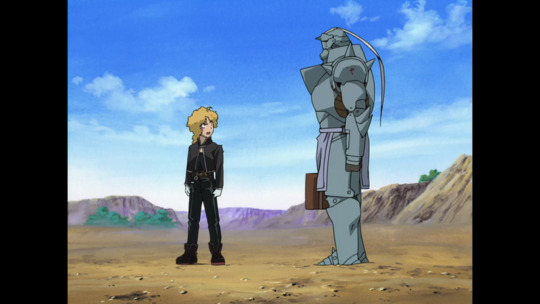

Ed and Al are, as ever, travelling alone and getting into conflict. These two are both pretty headstrong (though Ed more so than Al) and this episode perfectly captures their relationship.
They’re a bit stuck in their journey and they lash out at each other. Al’s irritated at Ed’s stubborness while Ed’s irritated at Al’s inability to express himself. Ed’s determined to go after Scar and the Philosopher’s stone while ignoring the proverbial elephant in the room that is the Homunculi - namely Sloth. Al wants to talk about Sloth but he is having trouble actually confronting Ed about it - he somehow manages to bring up Hohenheim of all people instead. In the end, they succeed only in getting angry at each other and storming off to sulk alone.
This is far from the only time we see the two arguing, they’re often at odds with each other actually. And no brotherly relationship we see in the story is perfectly smooth either.

Here’s a pair of Ishvalan Brothers. The younger brother is called Rick and the older brother is called Leo. Like Ed and Al they’re pretty close, possibly due to being orphans who have had a rough life so far and they have to really rely on each other. At one point, Rick has a PTSD flashback and Leo snaps him out of it, in a way that implies he’s used to it. In episode 24, the two of them are definitely in conflict over longstanding issues about their mother. Leo is angry that Rick cares so much about her as he has stubbornly convinced himself that she never really cared about them. Rick still has faith though.

Despite their differences in opinion though, Rick and Leo’s bond is still very strong. When Rick gets kidnapped, his brother immediately goes with Scar and Al to help rescue him. He is keeping quiet about a painful memory so that Rick doesn’t have to learn the truth and ironically that’s a huge part of why they’re in conflict. This invites you to contrast it with Ed and Al’s own fight in this episode. Where Al has convinced himself that Ed doesn’t really love him because he’s just a fake and meanwhile Ed has been keeping quiet all this time about his guilt over whether Al blames him for his condition - for the human transmutation. It’s only when they have faith and confide in their worries that both their conflicts are able to be resolved.
Speaking of Ishvalan Brothers, there’s another pair of them in this series who also struggled to relate to each other.

They are... an interesting pair. Scar’s older brother is dead when the series starts but Scar certainly thinks about him a lot. The two had trouble understanding each other with Scar’s brother being something of a heretic who performed alchemy - human transmutation and was... a little odd. Nothing like this crowning scene of him crying big tears in the middle of the day in the middle of a war and in front of his brother, while completely naked - right?
Still, Scar seems to desperately want to understand his brother. Some of his first words in the series is wondering what his brother wanted him to do with his arm. Upon encountering Ed and Al in episode 14, he immediately says that Ed reminds him of his older brother and ends up emphasising with Al. Another conflict the two had was that apparently he had feelings for his brother’s great love - the woman who became Lust. Central to his conversations with the homunculus is his complex feelings about his brother. Some of Scar’s final words are again reflecting on the Elric brothers and their close relationship to each other. He wishes he’d managed a similar relationship with his brother and quietly says “brother, I love you”.
Beyond their conflicts though, there’s also a theme of sacrifice.
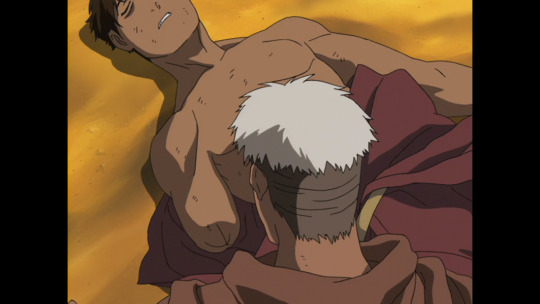
Scar’s older brother gave up his right arm (and this cost him his life) to save Scar’s life. That’s a pretty clear parallel to Ed giving up his own right arm to save his brother’s life. And later, Scar will give up his brother’s right arm to save Ed’s brother’s life. Yeah. Al really attracts sacrifice, okay? Al even starts developing survivor’s guilt over this. The series actually ends with Ed giving up his life to save his brother (though it only costs him the arm and leg he just got back. And to be stuck in another world...). And then there’s Al sacrificing himself to save his brother’s life.
Now, Ed and Al are a pair of alchemist brothers, who learned alchemy from their father’s notes. That is strikingly similar to another pair of brothers.

Russell and Fletcher Tringham steal Ed and Al’s identity in order to pose as credible alchemists so they can research and create a Philosopher’s stone. They are skilled alchemists themselves. Russell is pretty cocky and wants to bring Xenotime to its former glory through the use of alchemy. He’s willing to do some pretty immoral things to achieve this though.
Fletcher also wants to save Xenotime but he is more conflicted. However, he is scared to speak against his brother and has been reluctantly going along with things. Al emphasises with Fletcher and encourages him to confront his older brother, indirectly revealing some of the guilt Al feels for keeping quiet and going along with the human transmutation. Russell has been ignoring the warning signs, driven to believe he’s good enough to fix things. They’ve wound up on a similar path to the Elrics and the Elrics encourage them to find a new path even as they continue in their search. They see themselves in the Tringhams and warn them against it.
There’s one other pair of brothers Edward encounters and they remind him of his own brother.

No. 48. A pair of serial killer brothers who were both bonded to a suit of armour. The two of them are very much in sync given how they fight together, trade a bit of banter and are willing to protect each other while Ed is fighting them.
They’re also more literally bonded by past deeds than the other characters on this list. They both have to live as souls bonded to armour and it makes them feel inhuman. Seeing their hate for their current existence motivates Ed into fixing his own brother. It really drives home the horror of Al’s experience, helping to justify the identity crisis Al has while Ed fights the slicer brothers. Of course, Ed is driven to win by recalling his devotion to his brother. It’s ironic.
Ed is distraught when the Younger brother chooses to take his own life, no doubt thinking of Al. The older brother understands his brother completely though and tries to be comforting towards Ed though it doesn’t really help much. Mostly this whole experience really shakes Ed up and an episode later, Lust kills the older slicer brother while threatening to do the same to Al.
...
Okay, there’s one other pair I want to bring up though they’re not actually related.

Roy and Hughes have been close friends for a very long time. Hughes even goes to visit Roy to find he’s very nearly performed human transmutation. He challenges Roy on the issue, encouraging him to live and move on. When Roy tells him he wants to be Fuhrer, Hughes is there to say he’ll support him. We don’t learn too much about their history, but its obvious they are very close and both of them are also close to the Elric brothers.
A big reason to trust Roy in 03 is because Hughes cares so much about him. Hughes is the only person he reveals his worries and weaknesses to and Hughes really looks out for him. After Hughes is killed, Roy can’t bear to face Hughes’ wife Gracia, feeling some guilt and misery over his death. At Hughes’ grave, the piano version of Bratja/Brothers plays, as Roy mourns his dearest friend’s passing.
So, Episode 38: With the River’s Flow, begins with Ed and Al in a fight. Then the two of them go off to sulk alone for a while.

Ed’s angry and muttering about how irritating Al is but then he unthinkingly asks Al to pass the salt as he’s eating. Edward seems to realise that he’s driven Al away and he suddenly misses him. Immediately, he gets up and goes to look for him. The two of them are extremely codependent and can’t stay separated for long. Al, across town, is walking around, muttering about how stubborn Ed is to himself when someone taps him on the back and he immediately says: “Ed, where were you?” only to realise it isn’t his brother.
Ed has a flashback to when the two of them were kids and shows that they were close then too. They got into fights and they would run off but then Ed would come to his senses and go to look for his brother.

Ed doesn’t offer an apology out loud or anything. He just dismisses their fight, showing he’s forgiven his brother and Al smiles and runs after him. In the present, Ed finds Al at the river (which the episode is named for) and dismisses the fight the same way he did when they were kids. That’s very much Ed and Al’s dynamic.
During Al’s identity crisis, Al runs away and Ed wants to run after him (ready to throw himself off the roof even, because Ed’s always freaking out over his brother.) But Al takes some time to think through things while Ed and Winry spend that episode looking for Al. Upon meeting up again, they make up. Whatever happens they always forgive and go looking for each other.
Speaking of Brothers it would remiss of me to neglect to mention one other character.
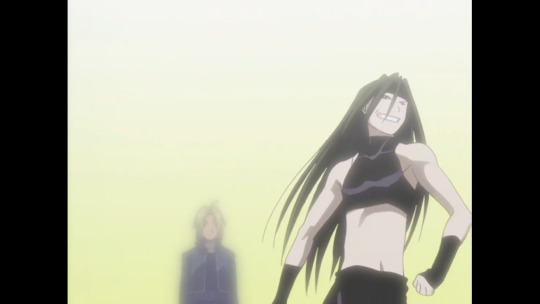
A homunculus created by Hohenheim in an attempt to bring back his dead son. Envy. He’s essentially Ed and Al’s half-brother. This is only revealed in the final episodes and Envy is a rejection of all the prior brotherly relationships we’ve seen explored throughout the series. Envy hates his family and takes great pleasure in tormenting the Elric brothers. Ed’s so shocked by the reveal that it gives Envy the upperhand, and he takes the opportunity to stab Edward through the chest. He laughs about it in victory.
Envy is a disaster but you can also see how he came to be the way he is. He’s never been loved by anyone, not his father who rejected and abandoned him and not Dante who uses and manipulates him to serve her needs. Envy does have reasonably decent relations with the other homunculi though - they seem to have bonded a little over shared circumstances. Envy gets on well with Lust and Sloth and at first seemed like a bit of an older brother to Wrath almost. He’s too mean and impatient to have a proper relationship though.
At the gate, Edward warns Envy not to cross through but Envy doesn’t listen and marches away, smiling. Edward’s face is covered in tears, both for Al who he’s losing and perhaps for Envy who could have been a better person were he not so bitter and full of hate.
-
Envy is an exception to all these different characters throughout the show who have strong familial bonds that they depend on. These bonds are often the only thing they can rely on when they’re hit with life’s tragedies as all these characters have very angsty backstories. No bond is more explored more than Ed and Al’s relationship, so this overview has mostly revolved around them.
Fullmetal Alchemist is the story about two brothers trying to regain what they lost and their relationship is central to the story. Through other characters we can see different aspects of it. The Tringhams, walking a dangerously similar path to them. Scar, who wishes his relationship with his brother could have been like Ed and Al’s. Roy, who is trying to do right and learn to live with the loss of his best friend. Rick and Leo, who are struggling together with each other and other Ishvalan refugees. And Envy, a chilling example of their antithesis.
Ed and Al’s relationship is very much my favourite part of the series.
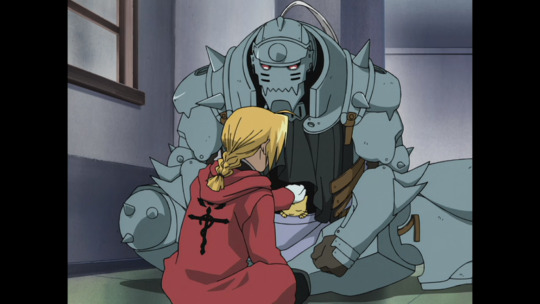
It’s why the ending is so tragic.
....
#fma#fma 2003#edward elric#Alphonse Elric#gosh these two are the best#scar being compared with Al is so interesting too#the slicer brothers are just painful#not to mention hughes and roy#all these posts and I've not yet spoken about winry#i think i should do a post on her soon#there's not really any sisters in fma#With the rivers flow is actually really short#most of the episode is about sheska and winry#i love it though#scars brother is crazy#hes amazing#envy is tragic when viewed from this perspective#ed's teary face#but seriously there's so much more i could talk about on their relationship#i only briefly talked about the identity crisis#there's also everything with greed#and wrath#and sloth#ed willing to kill for his brother#al willing to kill for his brother#in cos he sacrifices wrath for ed#and in main series he wanted to rip eds limbs off of wrath#the bit with the cat is adorable too#ed being overprotective is everywhere#this post still turned out so long
38 notes
·
View notes